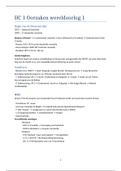Resumen
Nieuwste Tijd Samenvatting
- Grado
- Institución
- Book
Ik heb een samenvatting gemaakt voor het vak Nieuwstee Tijd, 1e jaar aan de HAN docent Geschiedenis 2e graads. De samenvatting is gemaakt aan de hand van de Hoorcolleges en het boek A History of Western Society van McKay.
[Mostrar más]





